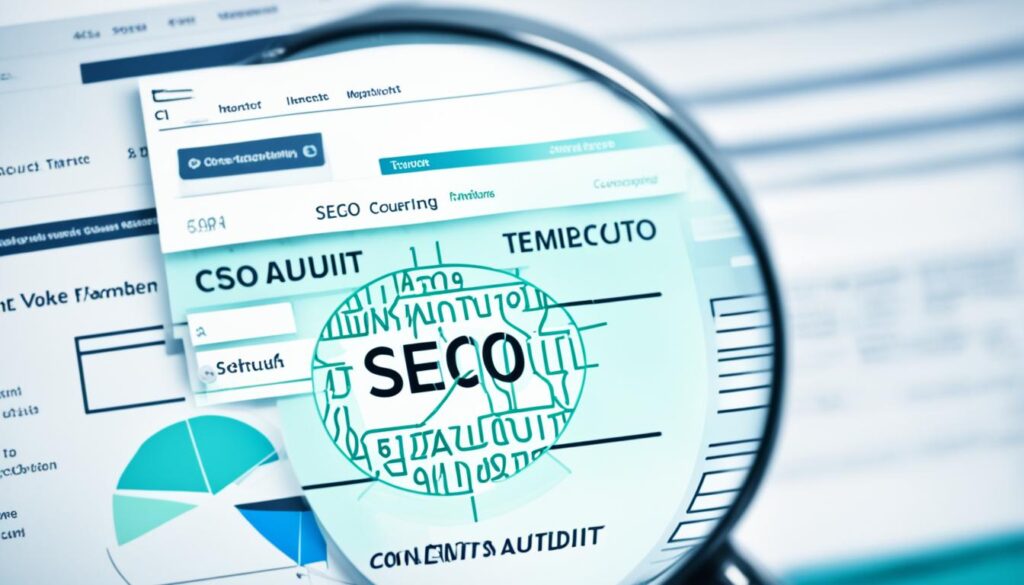An SEO audit is an essential process for evaluating the health and performance of your website. It involves a comprehensive analysis of your site’s technical aspects, on-page content, off-page factors, market competition, and keyword strategy. By conducting an SEO audit, you can identify issues and opportunities to improve your website’s visibility on search engines and drive organic traffic.
But how long does an SEO audit take? The duration of an SEO audit can vary depending on various factors. The size of your website and the level of investigation required can impact the timeline. For medium and large-sized websites, a professional SEO audit may take anywhere from 2 to 6 weeks. On the other hand, small to medium-sized businesses can expect an SEO audit from an expert SEO to take between 1 week to a month. If you prefer a basic free audit, you can perform it yourself in just a few hours.
It’s important to note that the cost of an SEO audit can also vary depending on the auditor and the scope of your website. Prices can range from $500 to unlimited, so it’s crucial to consider your budget and the level of detail you require.

Key Takeaways:
- The duration of an SEO audit depends on factors such as the size of your website and the level of investigation required.
- Professional SEO audits for medium to large-sized websites may take 2 to 6 weeks, while audits for small to medium-sized businesses can take 1 week to a month.
- Basic free audits can be performed by yourself in just a few hours.
- The cost of an SEO audit varies depending on the auditor and the scope of your website, ranging from $500 to unlimited.
- Regular SEO audits are essential to uncover errors and issues on your website and make improvements for better search engine rankings.
The Process of an SEO Audit
The process of conducting an SEO audit involves several steps. By following these steps and best practices, you can conduct a comprehensive SEO audit and optimize your website effectively.
1. Assess the technical aspects of your website:
- Indexation: Ensure your website is indexed properly by search engines.
- Redirects: Check for any redirect errors or chains.
- Page speed: Optimize your website’s loading speed for better user experience.
- URL structure: Ensure your URLs are clean and descriptive.
- Crawlability: Make sure search engines can crawl and understand your website’s content.
- Duplicate content: Identify and eliminate duplicate content issues.
- Mobile optimization: Ensure your website is optimized for mobile devices.
- Broken links: Find and fix any broken links on your website.
2. Analyze the on-page content:
- Content structure: Organize your content in a logical and structured manner.
- Keyword relevance: Ensure your content is optimized for relevant keywords.
- User experience: Improve the overall user experience on your website.
- Schema markup: Implement schema markup to help search engines understand your content.
- Meta data analysis: Optimize your meta tags for better search engine visibility.
- Page copy theme: Ensure consistency in the messaging and theme of your page copy.
3. Conduct an off-page SEO audit:
- Check the backlink profile: Analyze the quality and quantity of backlinks pointing to your website.
- References on the web: Identify mentions and references of your brand or website.
- Social media traffic: Evaluate the impact of your social media presence on website traffic.
- Competitor analysis: Analyze the SEO strategies of your competitors.
4. Perform keyword research:
- Analyze current keywords: Evaluate the effectiveness of your current keywords.
- Identify keyword suggestions: Find new keyword opportunities for optimization.
Following these steps and best practices will help you conduct a comprehensive SEO audit and improve the visibility and performance of your website.

SEO Audit Checklist and Best Practices
| Checklist | Best Practices |
|---|---|
| Assess technical aspects | Regularly monitor indexation, redirects, page speed, URL structure, crawlability, duplicate content, mobile optimization, and broken links. |
| Analyze on-page content | Create a well-structured content hierarchy, optimize keywords, improve user experience, implement schema markup, optimize meta data, and maintain a consistent page copy theme. |
| Conduct off-page SEO audit | Evaluate and enhance backlink profile, monitor brand mentions, leverage social media for traffic, and analyze competitor strategies. |
| Perform keyword research | Analyze existing keywords, identify new keyword opportunities, and optimize content accordingly. |
Factors Affecting the Duration of an SEO Audit
When determining the duration of an SEO audit, several factors come into play. These factors can influence the time required to perform a comprehensive analysis of your website and identify areas for improvement.
One significant factor is the size of your website. Larger websites typically involve a more extensive amount of data, making it necessary to allocate additional time for analysis. The increased complexity and volume of information affect the overall duration of the SEO audit.
The level of investigation and depth of analysis required also impacts the time needed for an audit. Professional SEOs who manually examine the data and provide personalized recommendations may take longer compared to automated tools that deliver instant results. The thoroughness of the audit plays a crucial role in ensuring accurate insights and actionable suggestions.
Furthermore, the complexity of the issues uncovered during the audit can influence the time required for resolution. If the audit reveals numerous technical or content-related problems, additional effort and time will be necessary to address these issues effectively. The severity and intricacy of the identified problems can have a significant impact on the duration of the SEO audit.
Considering these factors is essential when planning the timeline for your SEO audit. By understanding the size of your website, the depth of analysis needed, and the complexity of the identified issues, you can set realistic expectations and allocate sufficient time for the audit process.
Factors Affecting SEO Audit Duration:
| Factor | Description |
|---|---|
| Size of the Website | Larger websites require more time for analysis and evaluation |
| Level of Investigation | Custom manual audits may take longer than automated tools |
| Complexity of Issues | The severity and intricacy of problems impact the time needed for resolution |

Conclusion
In conclusion, the duration of an SEO audit can vary depending on various factors such as the size of the website, the depth of analysis required, and the complexity of the issues identified.
Professional SEOs may take several weeks to complete a comprehensive audit, while basic free audits can be performed by oneself in a few hours.
It is essential to conduct regular SEO audits to uncover errors and issues on your website and make improvements to increase traffic and visibility.
By following the steps and best practices outlined in this article, you can streamline the SEO audit process and optimize your website effectively.
FAQ
How long does an SEO audit take?
The duration of an SEO audit can vary depending on the size of the website and the level of investigation. Professional SEO audits for medium and large-sized websites may take anywhere from 2 to 6 weeks, while audits from expert SEOs for small to medium-sized businesses can take between 1 week to a month.
What is the process of an SEO audit?
The process of conducting an SEO audit involves assessing the technical aspects of the website, analyzing on-page content, conducting off-page SEO audit, and performing keyword research. These steps help evaluate the strengths and weaknesses of the website and uncover errors and issues that need to be addressed.
What factors affect the duration of an SEO audit?
Several factors can affect the duration of an SEO audit, including the size of the website, the level of investigation and depth of analysis required, and the complexity of the issues identified. Professional SEOs who provide actionable recommendations may take longer to complete an audit compared to automated tools that provide instant results.
